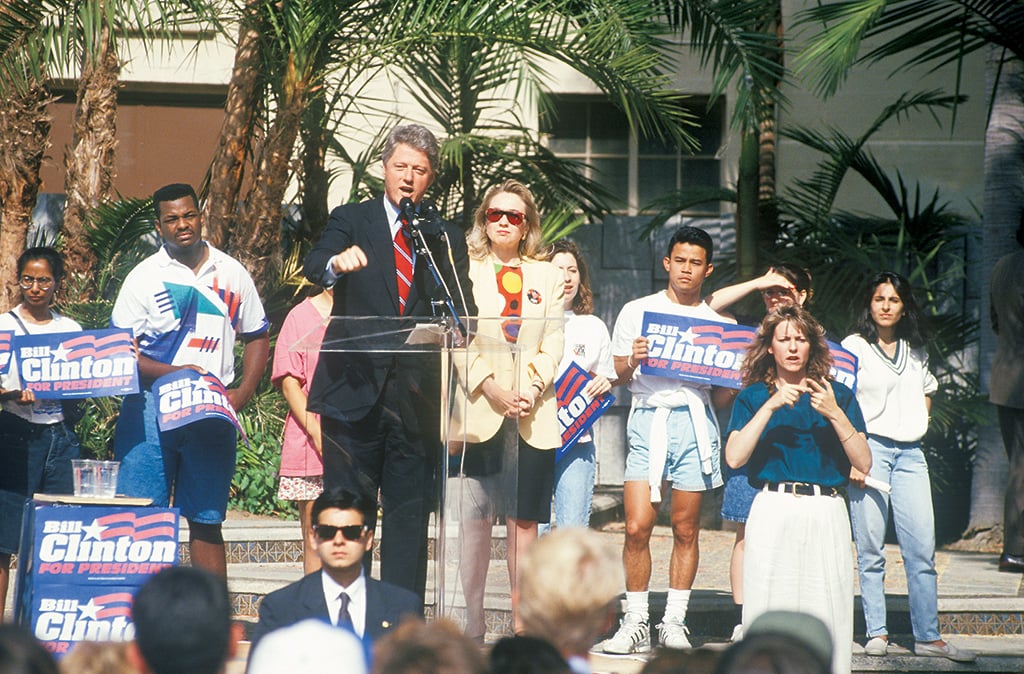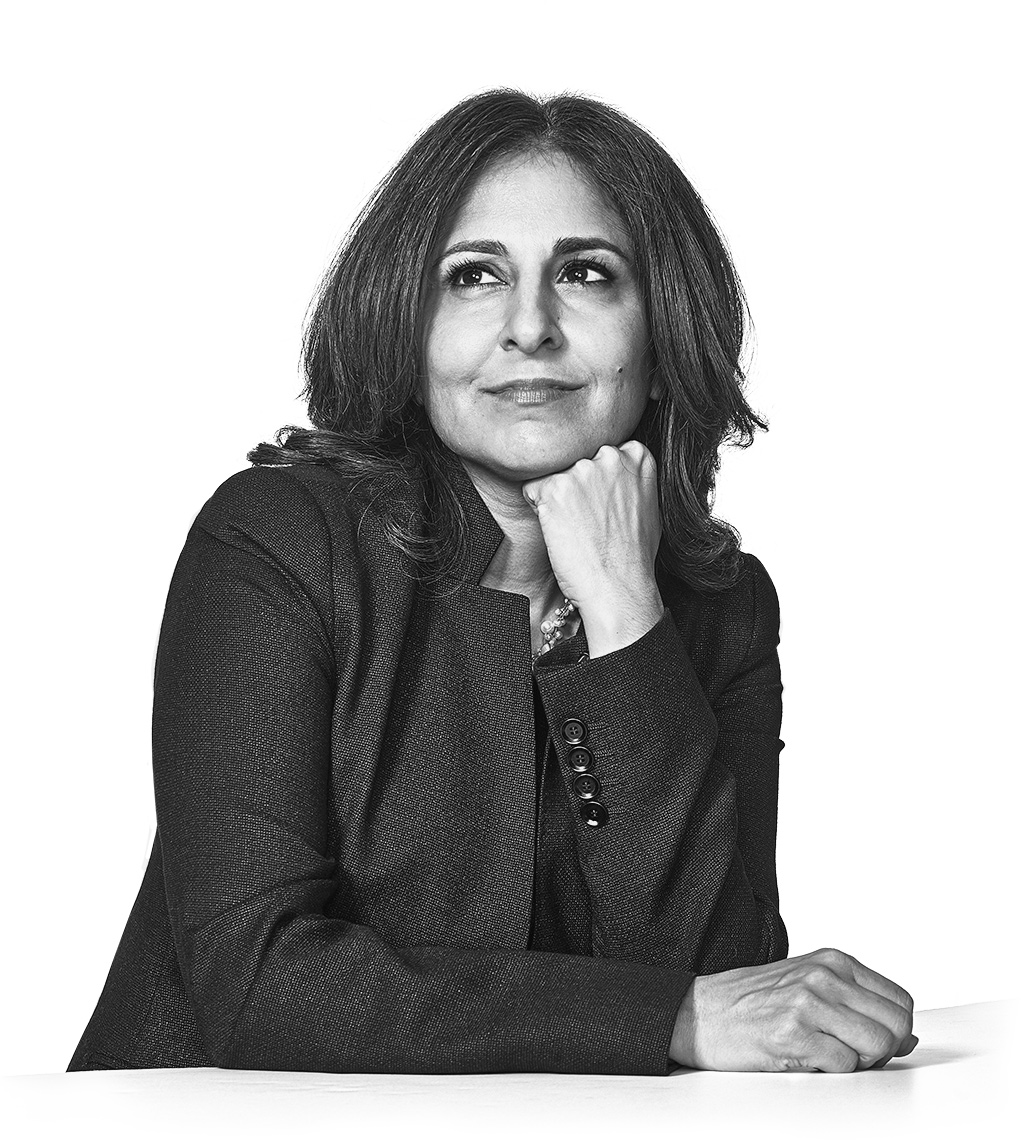A child of immigrants who got reduced-price lunches at school, a Massachusetts native who talks with a Southern California lilt, a Yale-trained lawyer and a former Hillary aide: Was there any doubt Neera Tanden would grow up to be a progressive?
But if the term brings to mind fuzzy idealism or strident protest, Tanden—president of the Center for American Progress (CAP), Washington’s most prominent think tank of the left—is a pragmatist who abandoned her To Kill a Mockingbird dream of becoming a civil-rights lawyer when Justice William Brennan’s retirement in 1990 dimmed her odds of winning Supreme Court battles. Instead, she says, “I went straight for politics,” working for the Democratic Party after graduating from UCLA and ending up as a senior policy adviser to Senator Hillary Clinton and a soldier in the health-care-reform fight for the Obama White House.
We talked to Tanden about the state of progressivism, the role of think tanks in the partisan brawl, and the possibility of a woman advancing to the Oval Office.
At the magazine, we’ve been playing a game: If Bernie Sanders were elected President, who would make our “who’s in” list in Sanders’s Washington? Elizabeth Warren and Al Franken. Locally, there’s Jamie Raskin and, at the Institute for Policy Studies, his father, Marcus. Beyond that, there’s not much of a progressive infrastructure in Washington.
There’s Media Matters and a host of progressive grassroots organizations like MoveOn.org that are more to the left than us. When we created the Center for American Progress in 2002, the left really only had single-issue groups, like labor unions, and think tanks, like the Economic Policy Institute, that did particular issues. There weren’t ideologically based organizations. But since then, there’s been a lot of growth.
But in terms of politicians, there’s not much of a range on the left.
Well, the debates within the Democratic Party today aren’t as profound as the debates on the Republican side—Republicans having cataclysmic debates about who they are. The questions in the Democratic Party are about how fast and how robustly to do something, not whether to do it.
Isn’t it an indication of where progressivism stands in Washington that CAP—which has “progress” in its name—couldn’t be more Democratic mainstream? You’re a former Hillary aide. Tom Daschle, who chairs your board, is not exactly a bomb-throwing lefty.
Our goal has always been to have a pan-progressive tent. In the 1990s, there was Third Way over here and the Campaign for America’s Future over there, and they were in kind of a war for the soul of the Democratic Party. We’re not trying to capture the Democratic Party from one side or another. The single theory that animates our work is how policy affects people every day. Many of us have been in government, so we know the tradeoffs you have to make. On the left, sometimes people don’t want to acknowledge that. But I think we have shifted the conversation in a progressive direction.
It’s been said that with so little policy getting through Congress, think tanks have become not policy shops but argument shops.
After the 2014 election, it was obvious things were grinding to a halt in Washington, so we redirected our resources. We pulled folks from our various teams to think through not just what’s happening on the Hill today but what challenges the country is facing.
But for instance, CAP has been credited with the idea of bypassing Congress using executive action. That’s a tactic, not policy.
That’s fair. But it was never a process in and of itself. We laid out the policies the President could achieve that way—immigration, clean-power plants, paid leave. I’m pleased because he has done most of what we asked.
So you don’t think you’re as partisan as, say, Jim DeMint at the Heritage Foundation?
I don’t score members of Congress; I don’t conceive of my job as moving members of Congress to the utmost left position. I put ideas out there, and sometimes they are going to be in line with the most progressive folks and sometimes with the most centrist.
If you’re not in the partisan scrum, though, isn’t your impact diminished?
The times we’ve had the biggest impact were when we had an idea one year and it passed five years later. An idea was in formation, and then a presidential campaign came along and picked it up. Traditionally, that’s how it’s worked, though this cycle it’s a little iffy.

What ideas of yours are out there in the current campaigns?
Look at the debate about income inequality and wage stagnation. We identified rising income inequality as one of the country’s biggest problems. That sounds like a ubiquitous concept now, but more than three years ago we put out a paper by a group of economists showing how income inequality actually hurts economic growth.
Speaking of which, some of our current issues—concentrated wealth, questions about the efficacy of our democracy—are also hallmarks of the progressive era, which is when think tanks got started.
They got started not only by progressivism but during the rise of scientism. It was a marriage of the two things—the idea that smart people could figure out how to make progress, which was an essential part of the New Deal. Then in the ’60s, the [Barry] Goldwater nomination really transformed conservatives. The country was moving in a liberal direction, they thought, because there were no think tanks on the right. So they invested in creating this infrastructure on the right.
You can make a connection between the Heritage plan for governance and Reagan. In the mid-’90s, the theory was that there was imbalance because Brookings was a neutral organization and Cato and Heritage and the American Enterprise Institute were all making arguments saying what the Clinton administration was doing was wrong.
But my question is—this anger that’s out there feels like a grassroots, progressive movement. Why isn’t progressivism capturing those people instead of Trump?
People are really frustrated because Washington hasn’t produced for them. The irony of Trump’s candidacy shows that the frustration is not libertarian, as the Republicans thought. People are happy to have the government provide Social Security and Medicare, to build a wall. He’s confused the whole idea that Washington doesn’t work.
As a progressive, don’t you say, “We have to get people to realize these things are solvable”?
It’s not a message campaign—we have to actually solve problems. In our meetings, we talk about the decline in poor whites’ life expectancy. In the 21st century, we should be producing expanding mortality rates for every citizen. I don’t care if it’s my voters or not my voters. As a progressive, I have a problem when any group is falling behind. After the President passed the Affordable Care Act, people in Southern states who got health care for the first time still voted Republican. A lot of snarky reporters announced this like it’s an indictment of the President. I fundamentally reject that. Government is supposed to solve people’s problems.
During the Clinton administration, you were a policy adviser to Hillary. In those days, the legend goes, the White House was Washington’s best think tank.
That was where I learned about how policy applies to people’s lives. Hillary is a policy wonk, but it’s not enough to pass laws—she wants to know how we get them implemented. My first big event with her, in January of ’98, was implementing the Children’s Health Insurance Program bill. She was a big force on getting that into the budget bill, but when the bill was done, she made sure there was a big take-up rate in the states. She worked with AT&T on getting a free 800 number [for families to call for information]. There was no money in the budget for ads, so we did PSAs and she met with the American Medical Association and pediatricians. She thinks in dry policy terms, but also how to actually make things work on the ground.
A decade later, you were one of the few from Hillary’s campaign who went into the Obama administration. How did you manage that?
I was the highest-ranking person on the Hillary campaign to go to the Obama administration, and I did it the hard way—I worked on his campaign.
Why did we get the impression there was bitterness in the Hillary camp?
No one hated Obama. Nobody was like, “That guy is a jerk.” My attitude going into that race was that it was terrible that we had two once-in-a-generation political figures campaigning against each other. I was deeply saddened when Hillary lost—I was heartbroken for her—but I didn’t hate Obama.
What was hard was that there were a lot of people in the Obama campaign who didn’t like Hillary—they didn’t roll out the red carpet for me. I definitely had a scarlet letter H on my chest. The person who always had the greatest respect for Hillary on that campaign was Obama himself. In my interview for the job, he told me, “Nobody knew what I’ve been through other than Hillary Clinton, and I know more about what she’s going through.”
Here the Democrats are with another chance to put forward the first woman for President. How do you think it’s going to go?
The issue of Hillary and gender is fascinating. I was shocked in 2008 that gender issues were so differently received than issues of race. People—liberals—would call Hillary a bitch. There were no aspersions about the first African-American running for President. Anytime anything racial came about, they pushed back really hard. But when things became gendered, there was so little social sanction for it.
The idea of having a woman President will be a monumental step, and I think Hillary will bring issues to the table that no one has before. But what I’m optimistic about right now is that when a bunch of male journalists say, “Why is she yelling at the rally?,” there is a big pushback led by women journalists. It becomes a meme. The world has definitely changed. I can see progress.
Senior editor Paul O’Donnell can be reached at podonnell@washingtonian.com. On Twitter, he’s @paulwodonnell.
This article appears in our June 2016 issue of Washingtonian.


















